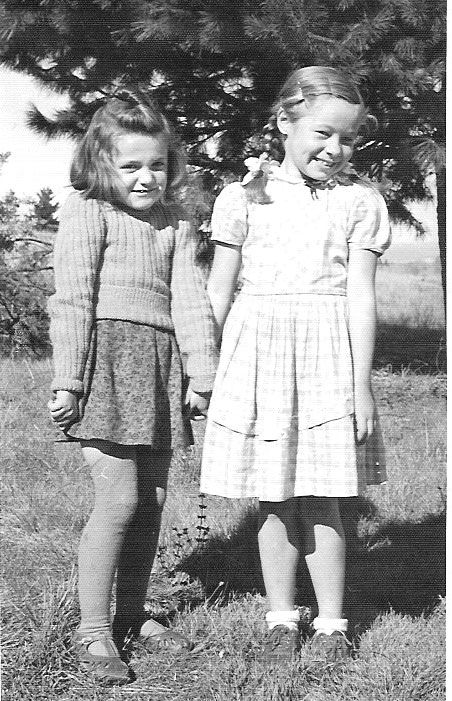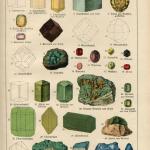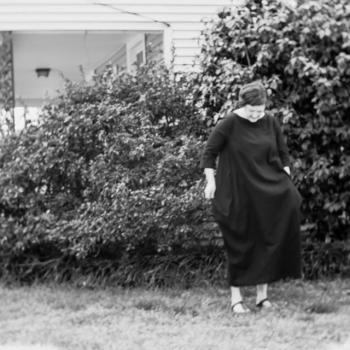Here is a faded picture of two girls, one blond, the other brown-haired, dressed up as Laura and Mary from Little House on the Prairie. The brown-haired girl, who is smaller, wears pink gingham and a sunbonnet. That’s my sister, whose hair is still brown. The blond girl, in blue, is me, but since I haven’t had blond hair since the year 2000, it’s hard to look at that child and believe that the camera was facing me: this body, this skin.
Though, on the other hand, the way biology works, all those cells that were me have since died and been shucked off, joining the cobwebs and dust mites, to be swept up from the corners and shaken from the bed-linen: remember that you are dust, indeed, little girl, is what I could say if I met my younger self. That or: whoever he is, he’s not worth it. Or: don’t take out student loans. Or: it’s going to be okay. There was a movie I saw once, about the cellist Jacqueline DuPre and her sister, Hillary, and in the opening scene the little girl meets a strange woman on the beach, who tells her something like that. It’s going to be okay. Later we find out the strange woman was her, grown-up, after she died of MS. She had blonde hair, her sister had brown hair, and they competed as artists, and bedded the same man. Hillary’s husband, to be precise. My sister and I may compete as artists but we keep our men separate.
Metamorphosis. When you’re a child you play pretend. You can be grown-up in an instant, a hundred feet tall, stomping on adults, stomping on the patriarchy. Or you can be Laura and Mary. I can’t keep track of the many people we used to become, in the course of a single summer, barefoot out in the pinewoods where everything smelled of turpentine and sometimes the slow menacing centipedes, black with yellow legs, would ripple across the path and remind us of death, things in pictures coming out of women’s mouths when they scream.
We used to personify inanimate objects, also: spoons, ballpoint pens, red-striped mints, vegetables. This was maybe partially as a result of reading too many Hans Christian Andersen stories in which fir trees and toys are filled with hopes and dreams and aspirations which are, invariably, dashed to nothing. In Andersen, striving to become what you aren’t is a kind of hubris: glorious, but doomed. You won’t get that from Disney, all American Dream, but in the original Mermaid story she doesn’t win the prince, and ends up as a spirit of the air, foam of the sea.
Not all that different from dust though, when you think about it.
There’s another Andersen story about peas in a pod. When we shelled peas – that mum would later freeze, as we froze or canned most of our food to get us through the winter – we got to thinking of each of those peas as a tiny being with a profound sense of its own destiny. Leaving a single pea alone, apart from its brothers and sisters, was an act of monstrosity, shattering dreams. Best bet was to eat them all. But this was a problem when we washed dishes. A single pea, or a scrap of macaroni from a plate, all alone on the cold bottom of the sink, was lonely, bereft. We had to do something about it.
Are you going to just leave that pea there? All sad and lonely? I’d say to my sister. It was filled with such hopes, and now look at it all alone in the sink, forgotten, desolate. You can’t just leave it like that.
She may or may not have eaten the slimy pea in the sink. I don’t remember. I remember her eating a rock once, and a scrap of paper another time, but she grew up to be a very successful English teacher at a world-class school, so it can’t have done much harm. I ate plenty of stupid things myself, later on: acid, mushrooms, ecstasy. They say that LSD never leaves your system, really, which seems a little unfair. All those cells, all my self, that smiling child in the blue sunbonnet, with her blond braids, blown to dust, but the acid remains.
So maybe if LSD can be lodged up my spine forever, spirits can linger, and it isn’t pure folly to talk to them. Faded little girls could show up and tell us it’s going to be okay. All those peas that we ate, not only because we liked peas, but to do them a favor, might be grateful. That’s some comfort. That’s some comfort as I go along shucking cells like seven veils, losing myself along the way, meeting myself, losing myself again. Again.
Rebecca Bratten Weiss is a writer and eco-grower residing in eastern Ohio, but often pretends to be in other places. She has co-authored two novels, as well as poems and essays in a variety of publications, and edits the arts journal Convivium, as well as teaching online for the Convivium School.
“Approaching Mystery” is a regular feature on Sick Pilgrim curated by Joanna Penn Cooper in which we post vignettes that dwell on the mystery of the everyday, that hang in an unresolved (and unresolvable) space of wonder and unknowability.
Read more of “Approaching Mystery” at http://www.patheos.com/blogs/sickpilgrim/2017/07/approaching-mystery-timekeeping/#25ffBLsikCcEjKBZ.99













